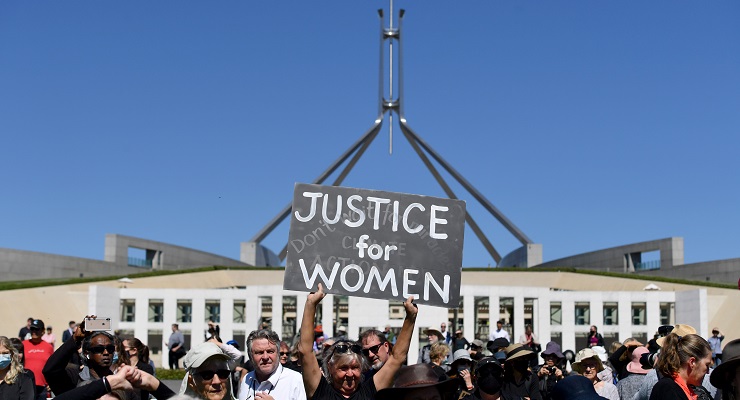
Australian politics got very personal this year. The injustices women have been battling for decades have been exposed at the heart of government: sexual assault, sexual harassment and workplace inequality. Women were treated as political inconveniences, minimised and denied.
In response, we rallied and marched, created petitions and demanded change. We don’t stand before our political leaders as blank slates, listening to their deflections and denials with equanimity. We come as women and girls who have already been harmed by the systems they govern. We have already been harassed walking on public streets and online, possibly at work. So many of us have experienced sexual and domestic violence.
It started young, and it doesn’t stop. It touches every aspect of our lives. It is personal.
The systems that are supposed to redress this are chronically underfunded and sidelined. Young men who speak up are silenced and women are ignored or used as political pawns. When women make it to leadership positions, harassment increases. Sometimes — we suspect — they have been driven out of their roles for daring to stand up to the male coteries that close ranks before them.
In the last wave of feminist activism in the 1970s, women argued that the “personal is political”. They wanted issues in their “personal” lives (child care, unpaid work and relationship violence) to be taken seriously as traditional “political” issues. While much has changed, those battles are still being fought.
It’s clear now that the political arena — where we look for solutions — is just one more part of the problem.
Today, Crikey tackled these issues head on. You can find all our coverage right here.
If you or someone you know is impacted by sexual assault or violence, call 1800RESPECT on 1800 737 732 or visit 1800RESPECT.org.au.
For anyone seeking help, Lifeline is on 13 11 14 and Beyond Blue is 1300 22 4636.








Class war, FYI. “Australian Values” as they really are. Some of us discovered it long ago.
Such as morrison and his misgovernment are not driven by our interests but by class plundering. They do not want to hear about what is good for us the 99%.
Demonising the Deficit has long proven an extremely useful distraction – after all, most commentators write about rebutting the Surplus Mentality, not something useful like what we could do with the money the government does not need to save.
All the abbott then trumbull then morrison Misgovernments showed utter disinterest in industry policy, instead obsessing with promoting the sunset industry of fossil fuels. All post-Fraser governments have to a greater or lesser degree systematically wrecked what was once an efficient public service, the organisation we now need more than any other. They hate working people as much as they hate good wages (except for themselves).
So China surges ahead while the haters fossick in the rubbish-bins of the unemployed to check whether they’re eating their bacon rinds.
Perhaps a good place to start would be noting that the political arena is NOT a place where any sane person would seek solutions.
Have to agree with you there unfortunately!
This broken record would like to add that any effort for change must first go through the prism of whomever owns and controls/funds mainstream media.
Nothing can change until this media relationship is torn down and rebuilt.
Otherwise what will happen is very little apart from superficial advertising campaigns that benefit private interests that torture the basic message of human rights to the point where it is a drab high rotation nonsense that means and changes nothing at all.
The only problem marketing gurus will have is that they can’t really sexualise physical abuse of women for profit on this one, or can they?
Aim the campaign at what influences the hearts and minds most, the owners of information outlets/government sponsors.
Learn from the neocon playbook,who have taken over control of media and can therefore choose governments and legislation to suit.
If i could give a thousamd upvotes to this comment i would.
Agree that politics appears to do more to thwart progress on this but while they legislate i’ll continue to agitate!
And speaking of thwarting progress – thanks Crikey for being the one media outlet today free of crusty dead royals.